The cover of the 1969 Doctor Who annual was artist Walt Howarth‘s last Who-related work for Manchester-based publisher World Distributors for some time, and its similarity to the cover of a 1967 Gold Key Space Family Robinson: Lost in Space comic was highlighted recently on social media, although, it should be noted, devotees of both franchises have spotted this before.
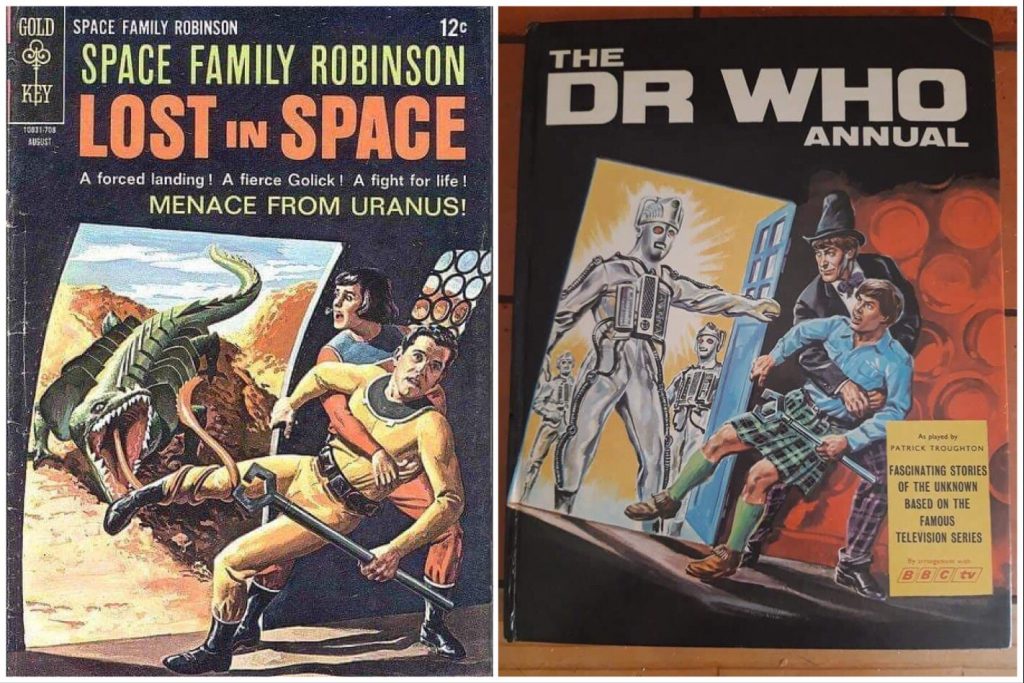
Given some modern day comic fans fascination with “Comic Swipes”, you could perhaps be forgiven for wondering if this one caused some friction between publisher and artist at the time. But in fact, Walt’s long career included connections to both Doctor Who and Lost in Space, and the “swipe” may well have been an affectionate homage to the latter which had gained him a fair amount of work at World Distributors.
Born in 1928, Howarth’s distinguished career spanned 60 years. He won a scholarship at the age of 13 to Bolton Art College, and in 1946, aged just 16, made his first professional sale, a cover to Bolton’s Salute to the Soldier Week programme.
He’s perhaps best known for his work on numerous British comic annuals, most for World Distributors through working for Manchester’s Industrial Art Services, initially on John Wayne Adventure Comics, a reprint of the Toby Press series, for which he subsequently became the regular cover artist.
His uncredited work graced the covers of annuals including Doctor Who, The Avengers, Tarzan and The Daleks – but as the company’s most favoured artist, he also created covers for annuals devoted to series such as Bewitched, Danger Man, James Bond, The Outer Limits and The Saint. He also contributed to interiors.
In his tribute on Bear Alley to Walt when the artist died in 2008, Steve Holland noted that “working from photographs of the actors, Howarth would have his covers painted almost a year in advance of publication as they needed to be printed in time for Book Fair in January. This occasionally caused problems and one of the few covers Howarth retained was an unused cover for Wagon Train which had to be repainted when actor Ward Bond died.
“As WDL expanded their output of TV related titles in the 1960s, Howarth worked on everything from action (James Bond, The Saint, The Avengers, Danger Man, Tarzan) to comedy (Bewitched, The Beverly Hillbillies, The Munsters). He became a constant watcher of television as many shows were unable to supply all the photographic reference he needed to be able to draw covers and provide all the internal illustrations for stories, features, endpapers, title and contents pages and games and puzzle pages.”
Through Industrial Art Services, Walter Howarth also provided illustrations for other companies, including jigsaw puzzles for Bonanza, Coronation Street, Rupert Bear and Disney characters. In later years, his work included illustrations for Ladybird’s 1980s Batman books. Health issues saw him retire from regular illustrating in 1993, though he continued to do private commissions until 2006, when failing eyesight forced him to stop. He passed away in 2008.
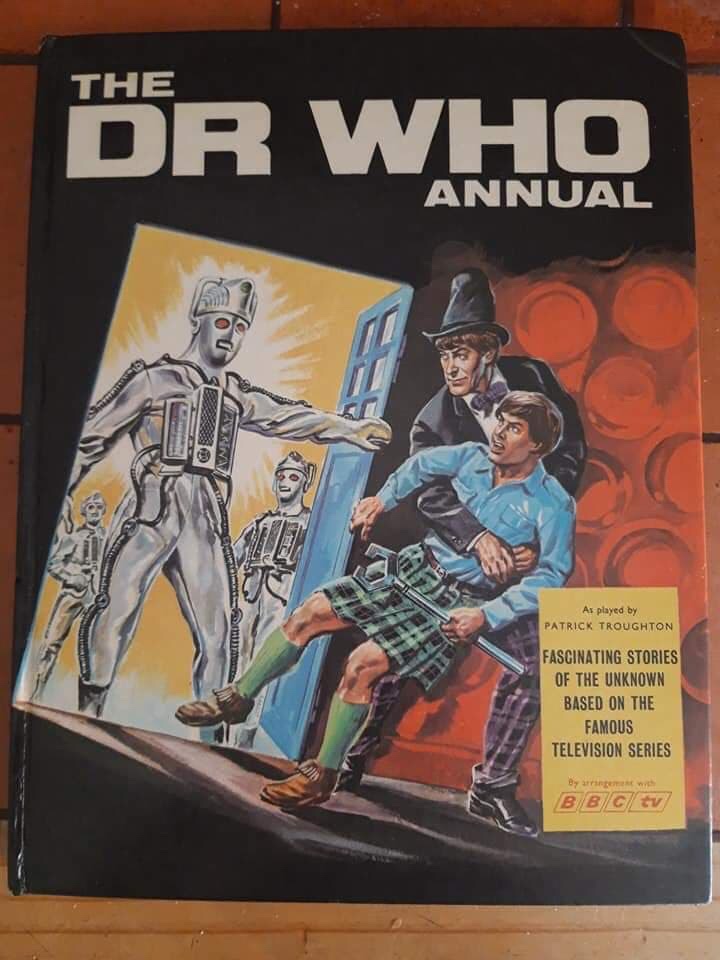
1969 Doctor Who Annual Cover by Walt Howarth
The 1969 Doctor Who Annual was published in September 1968, but, as noted above, the art would have been commissioned well in advance. Most annual work is still done well ahead of publication, even today. The Space Family Robinson: Lost in Space comic that inspired his annual cover was published August 1967.
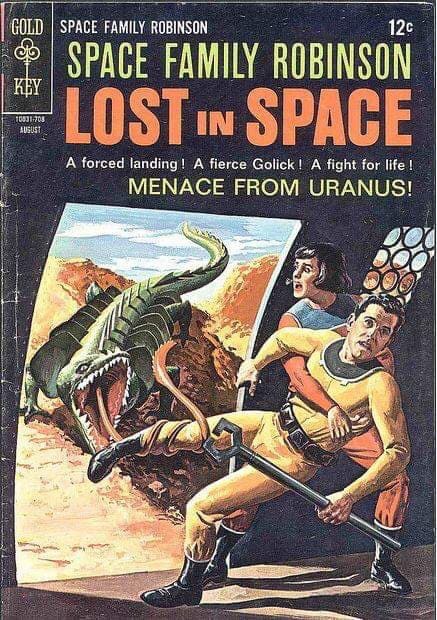
Space Family Robinson: Lost in Space – August 1967 – Cover by George Wilson
Western, the owners of Gold Key, were clearly adept at exploiting their strips in
pursuit of higher sales, since, as Mark Evanier has noted, sales of their books was the only way they could make money from them, unable to license characters for merchandise like US rivals such as DC and Marvel.
Gold Key comics were distributed in the UK, distributed by importers like Thorpe & Porter (although inconsistently as, Steve Holland noted in online discussion, it depended on what was left over by American youngsters). But Gold Key also licensed its strips for overseas publication, and local editions of their titles appeared worldwide.
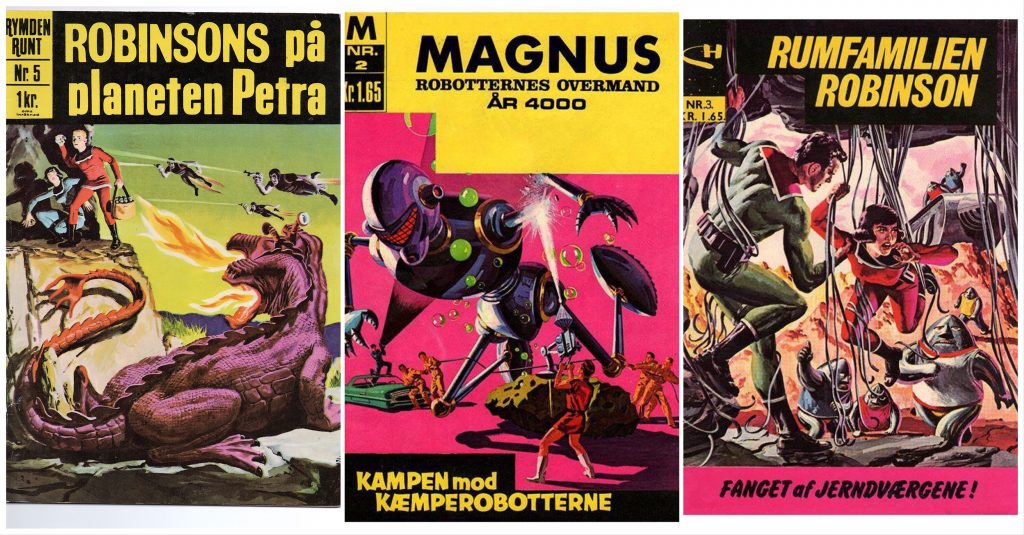
Foreign language reprints of some US comics, with thanks to N. Scott Robinson
In the UK, down the years this included reprints of Gold Key strips in titles such as TV Comic, and World Distributors published a Space Family Robinson annual.
Comics archivist Philip Rushton noted on the Comic Book Historians Facebook group that World Distributors got Howarth to completely repaint a lot of Dell/Gold Key covers for their British annuals and albums.
“As this included several Space Family Robinson books I’d guess that he was supplied with a bunch of the American comic books at various times,” he commented.
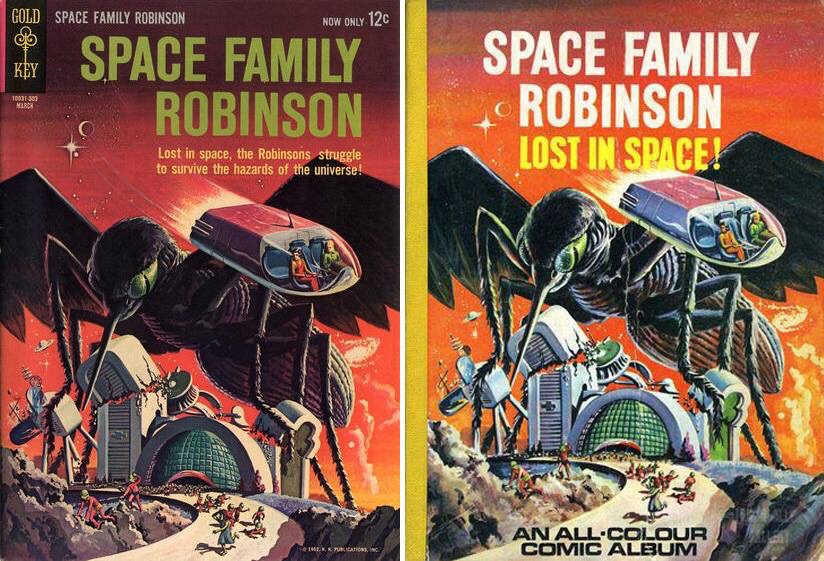
Left, a Gold Key Lost in Space comic and right, Walt Howarth’s version of the same image, for a World Distributors British annual cover. With thanks to Philip Rushton
(As an aside, Gold Key/Western Publishing published comic book tie-ins for almost all of Irwin Allen’s major 1960’s SF TV series such as Time Tunnel, Voyage to the Bottom of the Sea and Land of the Giants, but they had already published Space Family Robinson. Rather than changing the comic to suit the new TV series, the publishers decided to continue with the already popular existing story and characters, and based on editorial comments before the TV show launched, were clearly aware of its impending arrival).
Perhaps Walt unconsciously borrowed from a Lost in Space cover he’d seen for his Doctor Who annual art, or thought it would be a fun idea to homage Lost in Space, and see if his editors noticed?
Given the speed at which some of their contributors say World worked to produce their books, I doubt anyone did, but if so, then no-one cared what their best artist had done, especially as the number of imports of Gold Key comics paled in comparison with the huge print runs most of their annuals had.
However or why Walt homaged Lost in Space, we’ll never really know, but given this was one of his last pieces of work commissioned by World Distributors for some time, it was as successful an eye catcher as many of his other works, even if buyers were disappointed to discover there was no Cybermen story inside!
If you’re a fan of Walt’s work, as many are, then you may be interested to know that comic dealer Gary Wooton commissioned Walt to do loads of art in later life, as well as “what might have been” annual covers for TV shows that never had such annuals. He also painted some work for a prospective trading card series, and these occasionally turn up on auction sites.
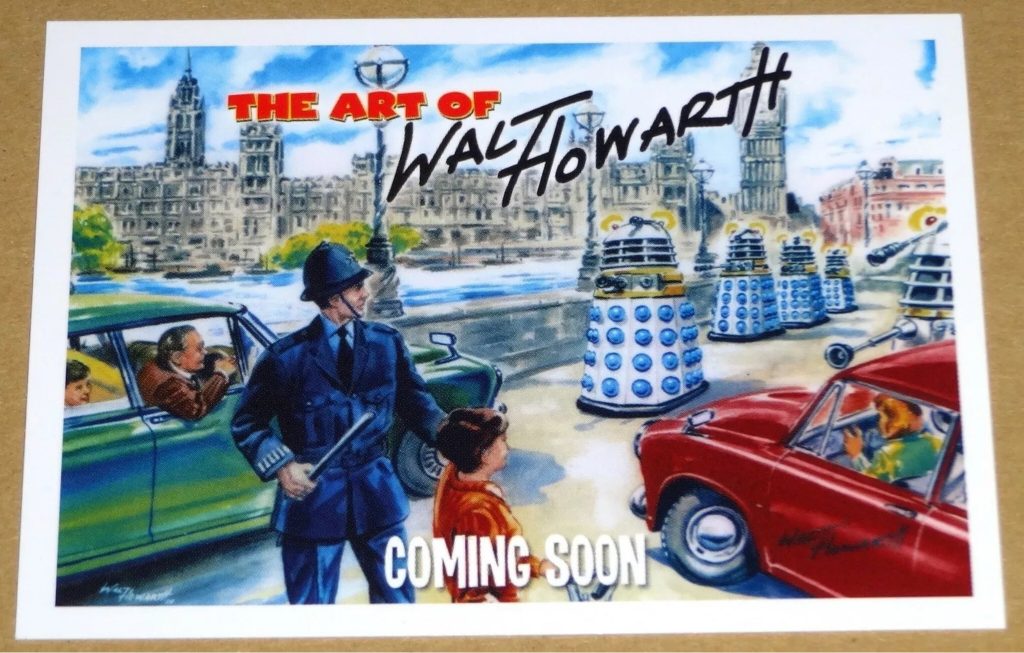
The Art of Walt Howarth Trading Card Promotion
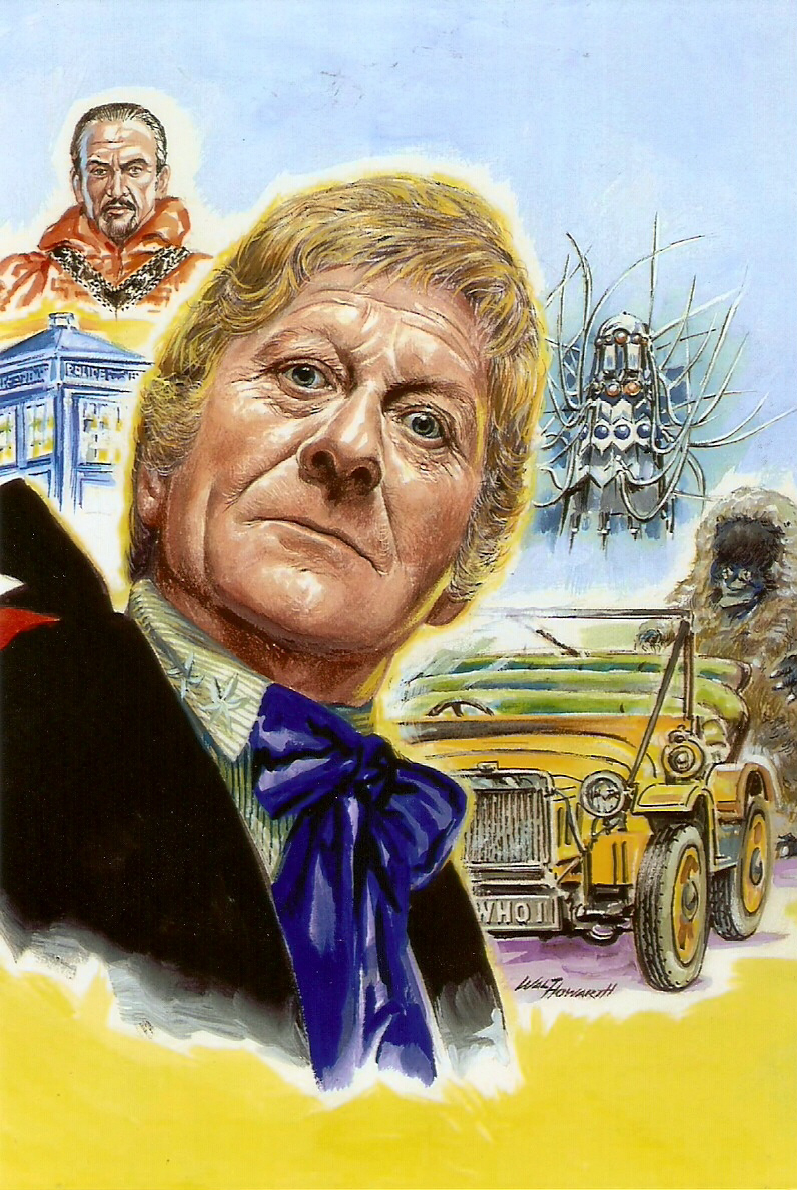
My thanks to Gold Key fans and the British comics archivists who contributed to discussion on this find on Facebook, highlighted by Paul Mount and Tymbus Robins.
• Read tributes to Walt Howarth on by Steve Holland on Bear Alley, Lew Stringer and here on downthetubes
Since posting this, we’ve been reminded of two other Doctor Who-related “Comic Swipes”, or homages – take your pick! Thanks to Will Brooks, Jon Preddle, Clacton Hickman and Robin Smith on Twitter
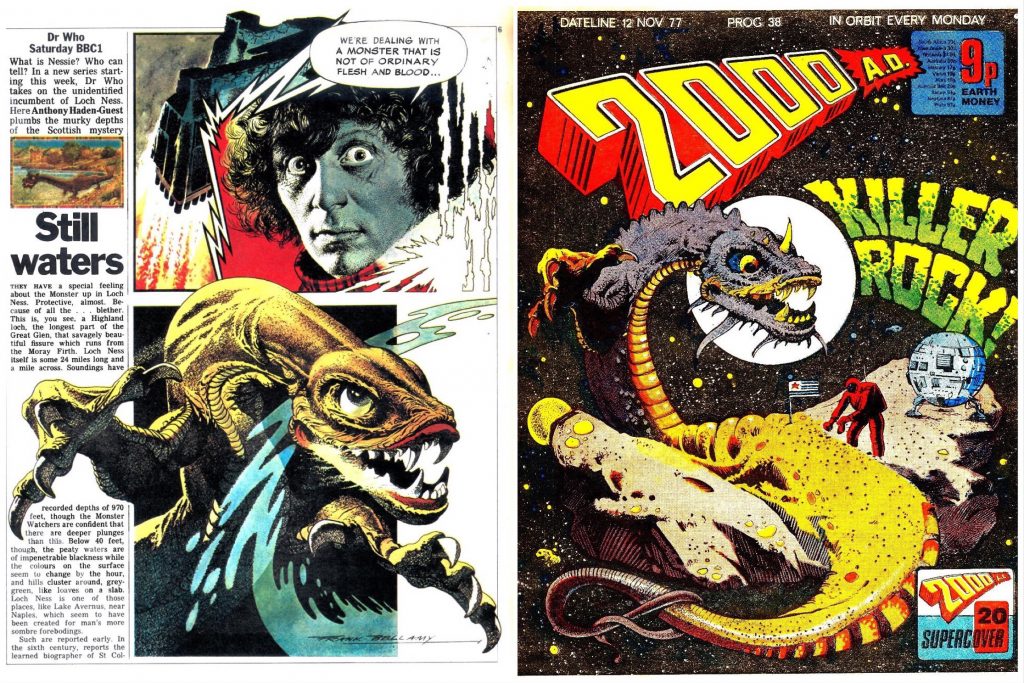
Frank Bellamy versus 2000AD!
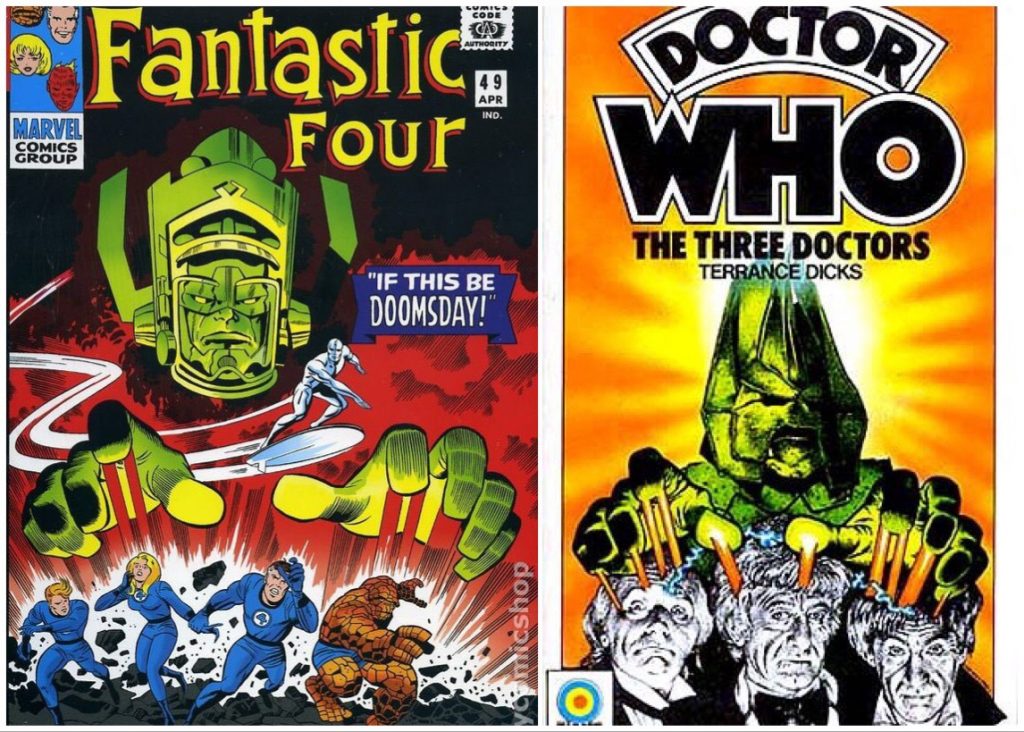
Fantastic Four versus The Three Doctors
The founder of downthetubes, which he established in 1998. John works as a comics and magazine editor, writer, and on promotional work for the Lakes International Comic Art Festival. He is currently editor of Star Trek Explorer, published by Titan – his third tour of duty on the title originally titled Star Trek Magazine.
Working in British comics publishing since the 1980s, his credits include editor of titles such as Doctor Who Magazine, Babylon 5 Magazine, and more. He also edited the comics anthology STRIP Magazine and edited several audio comics for ROK Comics. He has also edited several comic collections, including volumes of “Charley’s War” and “Dan Dare”.
He’s the writer of “Pilgrim: Secrets and Lies” for B7 Comics; “Crucible”, a creator-owned project with 2000AD artist Smuzz; and “Death Duty” and “Skow Dogs” with Dave Hailwood.
Categories: British Comics, Comic Art, Creating Comics, Doctor Who, downthetubes Comics News, downthetubes News, Other Worlds, US Comics
Fascinating spot.
It’s funny what you see in covers, I’ve always thought that Jamie had a (movie) Dalek appendage on the cover of the Dr Who Annual, but it’s there in 1967 on the Space Family Robinson cover.
Putting my Viz hat on, I’m amused by ‘A fierce Golick’ and ‘Menace from Uranus’ especially with the look on (John?) Robinson’s face.
Great post John
ARW